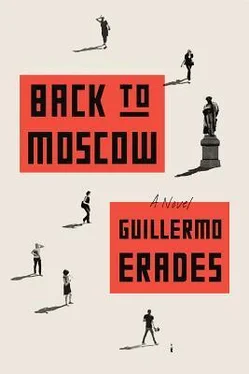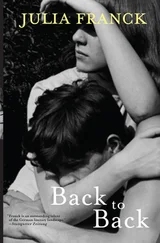‘You know the statue of Peter the Great?’ Sergey asked.
‘You mean the big statue in the middle of the river?’
‘Yes, Tsereteli’s statue,’ Sergey said, munching on a piece of cucumber. ‘I’m trying to capture all of its ugliness in one single frame.’
He laughed.
I laughed too. ‘I see.’
‘The statue is very symbolic,’ Ira said. ‘It’s representative of the new Moscow.’
‘Why Peter’s statue?’ I asked.
Sergey moved closer to me, lowered his voice. ‘Tsereteli’s statue represents the banality of modern Moscow.’
‘I find the statue hideous,’ I said.
‘Exactly,’ Sergey said. ‘Everybody in Moscow hates the statue. Only the mayor likes it. But the main thing is, the statue is not what it looks like. It’s a fake.’
Ira placed a boiled potato on my plate and one on Sergey’s plate. ‘Seryozhka,’ she said, ‘eat more. You shouldn’t have drunk before we started the party, now you are drunker than the rest of us.’
‘A fake?’ I asked. ‘In what sense?’
In what sense, v kakom smysle, was a useful expression I’d learned to drop into a conversation every time I got lost. It was particularly handy in a situation where a question was addressed to me, an answer was clearly expected, but my comprehension skills had let me down. Instead of asking for the question to be repeated, which would have cast doubt on my credibility as an interlocutor, I would just ask, ‘In what sense?’ It was such a useful phrase that, with time, I also began to use it when I didn’t know what to say and wanted more time to think. In what sense?
‘The statue wasn’t meant to be in Moscow,’ Sergey said.
‘It wasn’t?’
‘The statue was meant to be in the United States. It was commissioned as a present from the Russian people to the American people at the end of the Cold War. Americans didn’t like it so they said no thank you.’
‘Why would the Americans want a statue of Peter the Great?’
‘That’s the whole point,’ Sergey said. There was a bit of sour cream stuck on his thick eyebrows. ‘When the statue was made, it wasn’t Peter the Great. Originally it was a statue of Christopher Columbus, and it was meant to symbolise the union between the two sides of the Atlantic, or some shit like that. When the Americans refused it, nobody knew what to do with a giant Columbus.’
‘A waste of money, if you ask me,’ Aleksandra Olegovna said.
‘So,’ Sergey continued, ‘the mayor asked Tsereteli to turn Columbus’s head into the head of Peter the Great. And he fucking did! But they couldn’t find a place in Moscow to erect such a monster, you know, all the squares are occupied by Lenins and soviet stuff, so in the end they decided to plant the thing in the middle of the Moskva river.’
‘Martin, try the herring and beetroot salad,’ Sergey’s mum said. ‘It’s a typical Russian dish.’
‘Thank you, Aleksandra Olegovna, everything is delicious.’
Sergey began refilling the glasses with more vodka. ‘Mama,’ he said, ‘let him eat whatever he wants.’
‘So,’ I asked, ‘the statue in the Moskva river is not Peter the Great but Christopher Columbus?’
‘Exactly,’ Sergey said. He wiped his eyebrows, seemed puzzled to find sour cream on his fingers. ‘If you look closely you’ll see he is standing on an old vessel, from Columbus times, not from the times of Peter the Great.’
‘It’s a botch job,’ Ira said.
Aleksandra Olegovna stood up, started to clear some plates. ‘I can hardly recognise the city any more.’
‘This is Moscow today,’ Sergey said, putting a hand on my shoulder. ‘We are losing our soul and nobody gives a shit.’
LENA LIVED IN AN old kommunalka not far from Chistye Prudy, sharing the communal bathroom with three families and her bedroom with a girl from Tula. They had some kind of arrangement, I imagined, as the Tula dyev was never around when I visited and Lena and I could always enjoy a couple of hours of privacy.
Lena’s bedroom was a total bardak, a mess. The bedside tables, like every flat surface in the room, were completely covered in piles of books, old magazines, food leftovers, make-up paraphernalia, old cups of tea. The room always smelled of incense, which Lena kept burning in my presence — whether for some spiritual purpose or to mask other smells, I couldn’t tell.
One cold evening in late December we were lying on Lena’s bed, naked, listening to music from an Asian lounge compilation she liked to play when I was around. I had picked up a book from the pile on her bedside table, a cheap paperback on compassion, written, according to the back cover, by his holiness the Dalai Lama. I thumbed through the pages, many of which were dog-eared, reading the bits that Lena had underlined and trying to decipher the comments she had scribbled in the margins. It struck me that the Russian word for compassion, sostradaniye, derived from the word suffering, stradaniye, and literally meant co-suffering. A compassionate person was, in Russian, a co-sufferer. Considering this a valuable insight, I jumped out of bed and grabbed the red notebook I was carrying in my backpack.
I lay on the bed writing about the word compassion. Lena was staring at the ceiling in silence — her fingers fiddling with her golden chain, her perfect breasts swelling and ebbing with each breath, like waves in the ocean.
We hadn’t had sex. At least not sex sex. We had never talked about this but, as far as I understood, Lena didn’t enjoy the most primal aspects of human sexuality. For her, it wasn’t about gathering momentum and losing control. Lena approached sexual intimacy as a flat sensory experience, as a slow succession of caresses and kisses, which often remained at the level of touching. It wasn’t shyness or prudishness. Lena felt comfortable with her body. As soon as we were alone in her bedroom, she would often take her clothes off and go about her tasks in complete nakedness — making tea, lighting incense, moving piles of clothes from one bed to the other, fully aware of the powerful effect her naked body had on me. But once my own clothes came off, she would immediately apply herself to me, with precision, without pause, as if deactivating a ticking bomb. On the rare occasions when she had allowed me to get inside her, she had insisted on keeping the lights on and staying beneath me, her blue eyes fixed on my face. A few times, at the beginning, in the heat of the moment, I had tried to wrestle her on top of me, to give her more control, to fully appreciate the weight of her breasts, but she had always climbed off right away; and once, when I’d tried to stay beneath her body for a few seconds, she had abruptly jumped out of bed and run off to the bathroom — to return a few minutes later, her eyes red from crying. On that occasion I’d asked her what was wrong. Nothing, she’d said. But ever since that day, I always followed Lena’s lead, her tempo, her moves, adapting my own expectations to whatever she was in the mood for — afraid to cross a line that, I suspected, originated in some obscure episode of her life.
I circled the word compassion in my notebook and dropped the pen. I turned to Lena, grabbed her golden cross. ‘What’s this?’
‘From grandmother.’
‘Beautiful.’ I found Orthodox crosses aesthetically interesting, the slanted lower crossbeam breaking the symmetry of the design.
‘Do you believe in God?’ Lena asked, staring at the ceiling.
I was aware of Lena’s spiritual side, but it had never occurred to me to raise the question myself.
‘No, I don’t,’ I said. ‘You?’
She thought about it for a few moments, as if she were considering God’s existence for the first time. Then she turned to me. ‘I believe there is good and there is evil.’
Читать дальше












